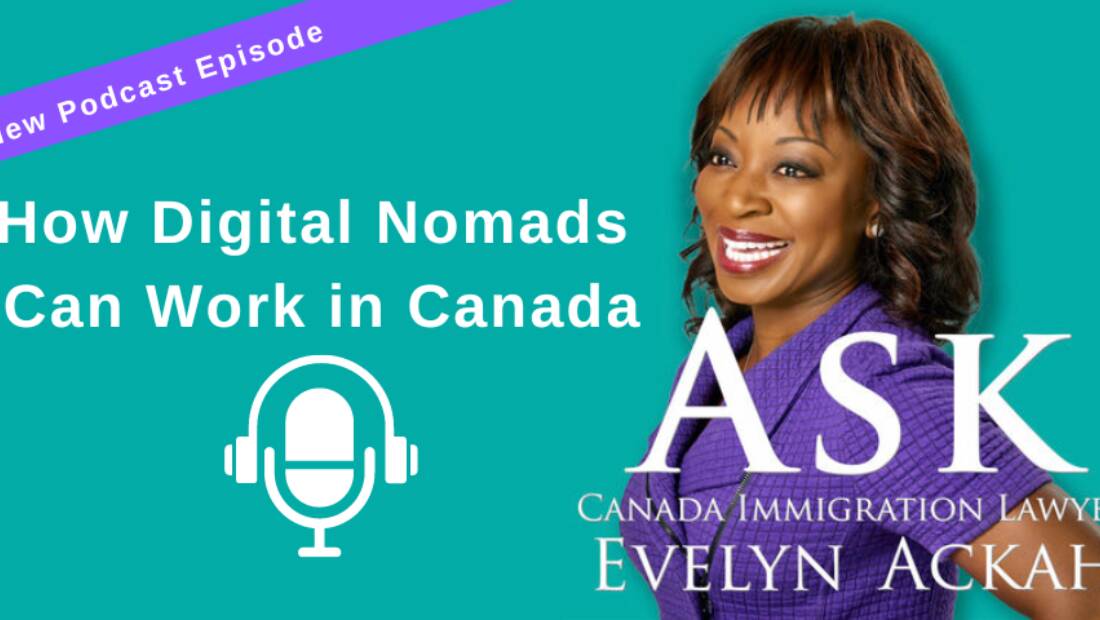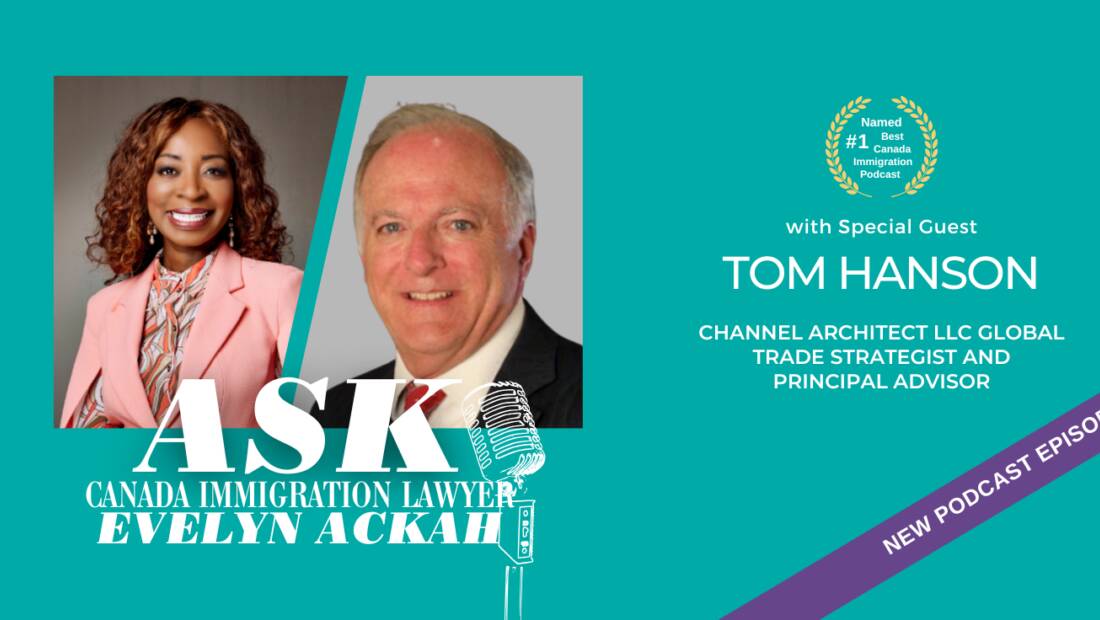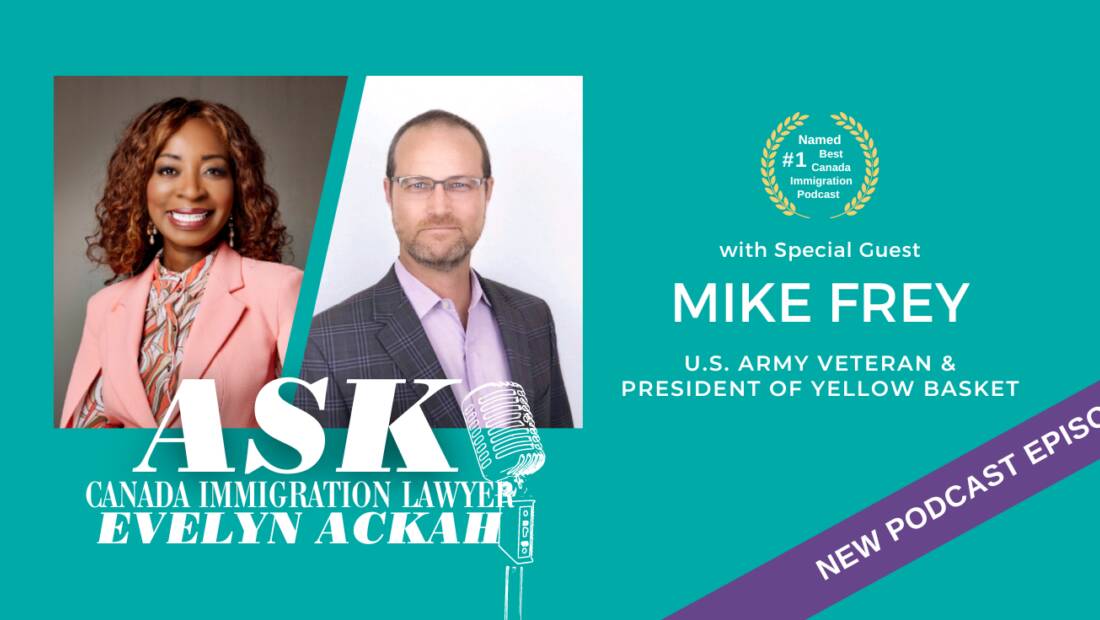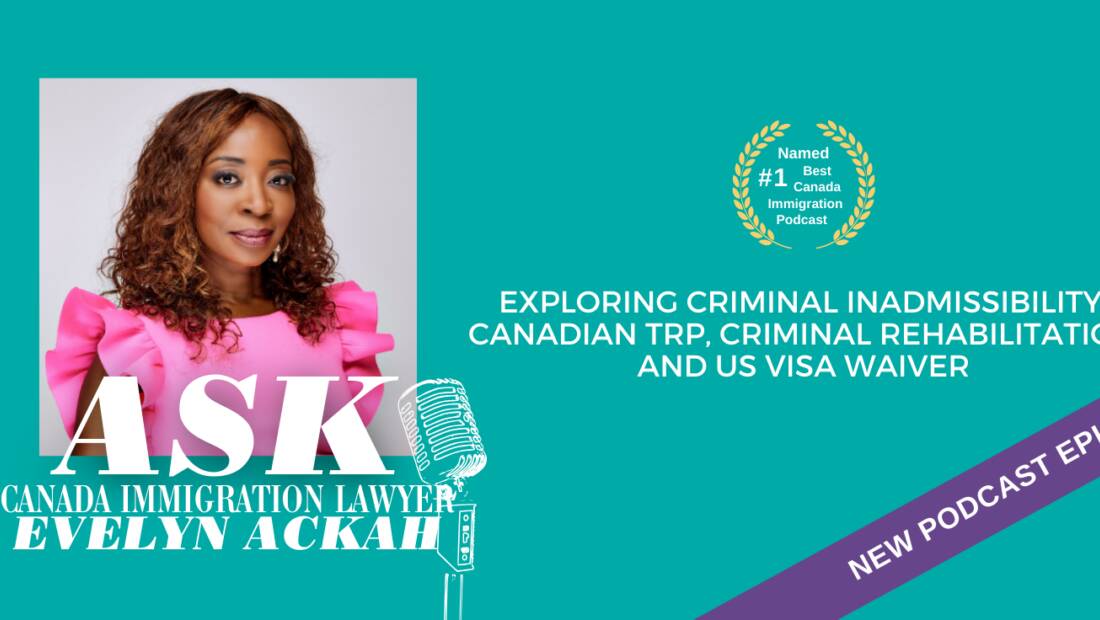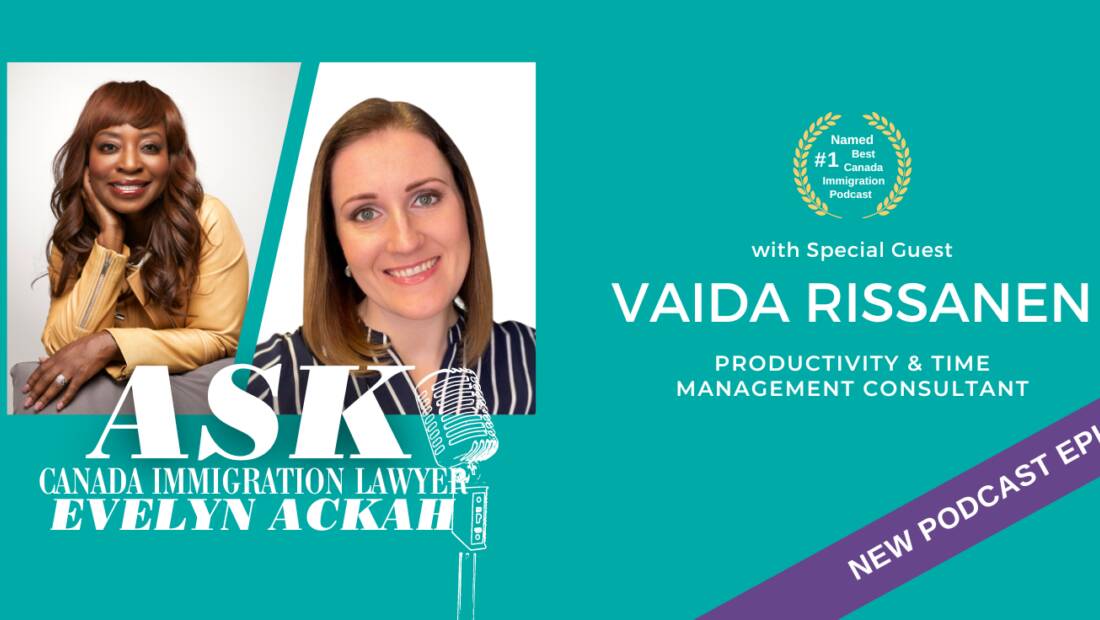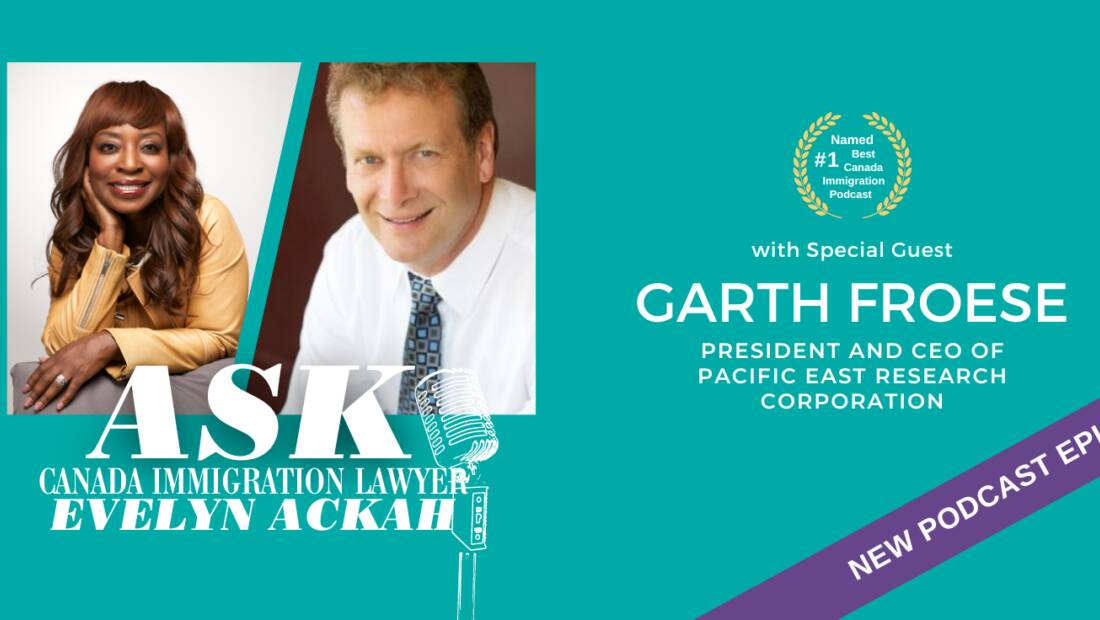Or listen on your favourite podcast app
BOOK YOUR FREE CASE EVALUATION
Calgary immigration lawyer Evelyn Ackah talks about the growing lifestyle of digital nomads and remote workers who want to work from anywhere, not necessarily their home country or the country where their employer is located. Often also called TechPats, digital nomads need an internet connection. According to Forbes, "The digital nomad lifestyle has been on the rise for years. Then when Covid-19 hit, the popularity of this new way of working exploded." To work in another country, digital nomads needs a visa. Since Canada does not yet have a digital nomad visa, how can digital nomads work in Canada? Many digital nomad visas are in countries with year-round warm weather and beaches, how can Canada attract digital nomads, freelancers and self-employed as well as remote workers who work for foreign employers?
- What is a digital nomad?
- How digital nomads, freelancers and the self-employed can work in Canada and even become permanent residents
- accompanying spouses
- self-employed visa
- startup visa
- The U.S. doesn't have a digital nomad visa yet either
- Options for people when they want to work for Canadian employer
- consulting work permits
- working holiday program for people that are under 30 or 35
- Tax implications for digital nomads
- Issues for employers of digital nomads and remote workers to consider
Learn More:
- FAQs: As An American, Do I Need a Work Visa to Freelance in Canada?
- Digital Nomad Visa: How To Be A Remote Worker in Canada
Sources:
- https://www.investopedia.com/countrie...
- https://canada-immigration.lawyer/dig...
- https://adamfayed.com/living-as-a-dig...
- https://www.digitalnomadsoul.com/digi...
- https://www.linkedin.com/pulse/how-hi...

About Evelyn Ackah
Evelyn Ackah is the Founder and Managing Lawyer at Ackah Business Immigration Law. We work with individuals and business owners from all over the world who want to cross borders seamlessly. For more information on immigration to Canada or the United States, Ask Evelyn Ackah at Ackah Business Immigration Law today at (403) 452‑9515 or email Evelyn directly at contact@ackahlaw.com.
BOOK YOUR FREE CASE EVALUATION
Transcript
Good day, everyone. This is Evelyn Ackah from Ask Canada Immigration Lawyer Evelyn Ackah Podcast. I'm very happy to be with you today. And we're going to be talking about digital nomad visas. Today, Canada does not have a digital nomad visa yet, but I want to talk to you today, and it'll be a little bit more of an informal webinar podcast, no slides today, but I want to talk to you about what is a digital nomad. It's something that recently came to my mind and I started seeing it more and more. And honestly, it's somebody who is able to work remotely, usually people in the technology, social media world. They can travel and do their work from wherever they are, and they're called digital nomads. They're able to create work and revenue and produce products for their clients, but their location of work really has no bearing on their ability to produce good quality work and also make a living.
And one of the benefits I would say of being a digital nomad is that you get to travel the world. You get to have flexibility in terms of when you work, how you work, and it allows you to probably save some money as well because you don't have to deal with commuting. You don't have to deal with dressing up for work. You don't have to deal with having an office space. You can do work anywhere, whether it's on the beach or in another location somewhere around the world.
Right now, Canada does not have a digital nomad visa program, but I want to tell you about some of the countries that do offer them, and we are hoping that Canada will start implementing a digital nomad visa at some point, just because we are so focused on keeping high tech talent and also attracting talent to Canada. So this might be a good way to further develop that industry in Canada.
So I would say that the digital nomad kind of idea really grew and evolved more during COVID-19. And people were asked to work remotely and work from home, many people realized they didn't actually have to stay home. They could do their work from anywhere in the world. And if they were, let's say, separated from family and friends, they were able, when things were safe to travel, and do their work from anywhere. They did not need to be here in Canada working necessarily. They could work anywhere they wanted. And so that is really I guess the real crux of it.
Currently, the United States is estimated to have 4 million digital nomads, and in the world, there are approximately 15 million. So this is a huge market that may be untapped for some employers who may want to look to hire people from all over the world. They don't need to be in your jurisdiction for you to engage them, contract them, or hire them directly. The people who want to become digital nomads tend to be people who love to travel. They love change. They love new challenges, and they're obviously self-motivated, organized and focused because you have to be able to drive yourself and be successful if you're going to be a digital nomad. No one's going to tell you when and how to work. You just need to produce results. And that is a big part of the program, I would think, in other countries.
So let me tell you, obviously there are a lot of things that come up when you think about digital nomads, how they get paid, who they work for, what jurisdiction takes responsibility for them, taxes. So I'm not a tax expert, so I'm not going to get into it, but I just want to raise and flag these issues. If you have employees that are working remotely, you need to be able to think about where they're doing their work and who's responsible for their taxes, or is it better to just have them as contractors so they're not full time, permanent payroll employees, and you don't have to think about everything like benefits, taxes, et cetera?
So one of the things I wanted to share is the number of places that allow for the digital nomad visa. Let's talk about those countries. So one of the countries is Anguilla, and another country, seems like there are a lot of smaller countries, Antigua, Barbados, The Bahamas and Cape Verde allows for it. And a lot of times they have specific requirements. If you want to live there and do work, Costa Rica is another one. Croatia, interestingly. The Czech Republic, Dominica. So a lot of Caribbean islands. I guess people want to go there, live on the beach and do their work from wherever they are. Estonia, Georgia, Germany, Iceland, Malta, which we know is definitely a tax haven for different people, Mauritius, Mexico, Montserrat, Norway, Seychelles, Taiwan interestingly enough. So those are just some of the countries that are actually already actively engaging in the digital nomad visa programs, where they have criteria as to what you need to do to become a digital nomad in terms of the visa that you have and what you're allowed to do and how long you're allowed to stay there.
So before you decide you're just going to pick up and leave, you need to do the research. What's going to be required of you if you want to come and go? Do you have to stay for a period of time? Do you have to leave and reset the visa after every three months or six months? You need to know all that information before you make the choice to leave your home and go and explore the world and work remotely.
Right now, I would say Canada, as I said before, doesn't have a digital nomad visa. However, there are other ways that people can come to Canada. We have a number of people that we've worked with at Ackah Business Immigration Law, who may be accompanying spouses that are either Canadians or they're being sponsored, and they want to remain working for their foreign employer. You can do that. As long as you have legal status in Canada, you can come to Canada and work remotely for whoever your employer is, so long as you have legal status to enter and remain in Canada. So that way, if you maybe don't work for a company that has a Canadian entity that could transfer you, you can stay on the payroll. You can make those arrangements and you can come to Canada and be a remote worker from inside Canada. That's not necessarily the same as a digital nomad visa where it's set out specifically for you to be able to come and do that work.
And so one of the possibilities for that would be there's something called the self-employed visa category in Canada, where you basically sponsor yourself. And that's based on you having at least two years or more experience to show that you've been running your own operations already for several years, and that you're bringing expertise. A lot of times it's in IT, cultural arts, that kind of area, high tech. So if you're able to qualify for the self-employed visa category, you could be a digital nomad working in Canada and working for clients all over the world. They don't need to be Canadian based clients so that you can then live the life you want and decide if Canada's where you want to make your home and look to permanent residents options down the line.
Another option for people who want to come to Canada is the startup visa category, and the startup visa is the program where you can basically start up a business with support from an incubator or other kind of agencies to set up a business and basically start it up, and most of those people who work in that field are in the digital high tech startup world. So this is the perfect visa for you. Okay.
One thing I would say is we're not at the place yet that we're able to say that, "Come to Canada, we have a specific visa for you." That's not the case. And it's interesting enough, the US doesn't necessarily have an exact one either that fits those people who want the flexibility to come and go. But there are many, many visa options for people who want to come to Canada and live as a digital nomad working for a non-Canadian entity. So those are the things that I want you to think about is if you have people who want to come to Canada and explore and see the Rocky Mountains and other things like that, you want to be able to consider what exactly it is that the digital nomad visa allows you to do.
As I said, this will be a shorter webinar podcast because this will also be shown on the Ask Canada Immigration Podcast, so you're welcome to check it out. But if you have any questions at all about the Canadian options for you if you want to be a digital nomad, if you want to come to Canada, at Ackah Law we can definitely assist you to find options so that you can come to Canada, continue working for your employer that you're working with overseas, and be able to be legal and be able to explore Canada, almost like a tourist working here. In Canada, we have so many options for people when they want to work for Canadian employer, but there are very few options for the digital nomad type of arrangement. Some people come in under consulting work permits, where they get to be contractors, and that's another option for them where they can then work for Canadian entity, but they're not directly employed and they have some more flexibility in terms of coming and going.
There's also the working holiday program for people that are under 30 or 35, depending on the country you're coming from. So that also allows people to come and work as much or as little as they want, but also to be able to explore Canada and have that experience of being a digital nomad and kind of free.
One thing that I've mentioned already that's really important is the tax implications. You definitely want to have a good tax advisor wherever you end up coming. Whether you come to Canada or the US, or you're traveling the world, you need to think about what are the tax implications for making money all over the world. You need to know where you have to file or where you don't have to file. And so I think that's very important before you launch into this is looking at tax, looking at benefits, looking at travel insurance, looking at the visa types.
I've mentioned already all the countries that currently have very concrete digital nomad visas, whereas in Canada and the US we don't. But many, many Caribbean countries, Mexico, as I mentioned, lots of people who want to live on the beach, it seems like those countries are really encouraging the digital nomad visa to be able to bring people into their countries and obviously help also grow the economy.
So I'm hoping that as Canada further focuses on the need for Canadians and the real demand to grow our IT and our startup economy, that they will launch a similar digital nomad visa or create even more options and more streams for people who want to be free enough to do the work and still have legal status, and also perhaps options for them to move into permanent residents down the line in Canada. Right now, if you're self-employed is not the easiest to be self-employed and become a permanent resident. You have to really go through a lot of hoops for that to happen, if you're not working for a Canadian based employer.
So, as I said, this is very high level today. I'm not going to do a presentation in terms of slides. I wanted it to be a little more casual than what I've been doing, but I think for employers, you need to think about, one, where are people working, where exactly they are based, what are the tax implications for employers. If you actually employ them and they're not seen as employees or contractors whose obligation around the tax issues, I think arise. Those tend to be the major issues for employers and I want you to consider those options before you engage in hiring somebody overseas who's living the life of a digital nomad. You want to be certain that the employer is ready and thinks about benefits, liability, taxes, et cetera. And also, how do you contract that person and how do you terminate that person? So those things around the jurisdiction, which jurisdiction is going to rule in terms of employment standards. So just a lot of things to consider before you move into that sphere.
One thing that I heard today on the news is that there are many people working remotely that actually have more than one job, and their employers aren't actually aware they work for two employers full time, and because everything is remote, they're able to hustle and do both. So you want to know, for instance, if you're the employer, can you have other jobs? Are you limited to just the employer? Is that in your contract or are they allowed to freelance and do work for other people as long as the work for you is getting done? So these are some things I want you to consider.
We have a couple of people who joined us on the webinar. I'm wondering if you have any questions, if you'd like to ask me, this will be a shorter webinar podcast than normal.
Kristin, Pam, anybody have specific questions?
So it looks like nobody has questions. And as I said, this will be on our Ask Canada Immigration Lawyer Podcast, and I'll have some links as well to the resources that I found for purposes of doing this very brief podcast webinar, because I don't think a lot of people even know what a digital nomad is, and it's such an interesting concept as we look globally at where people are living and working and how to do it successfully so that you ensure that you're not liable and you don't have problems down the line with the tax.
So, as I said, I'm going to end now, but I want to thank you for joining. And if you have any questions, feel free to contact me at ackahlaw.com, 403 452 9515. Take care and stay safe. Bye-bye.

